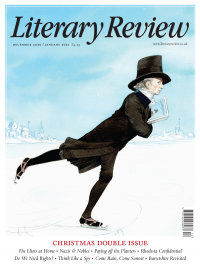James Hall
Between a Rock & a Hard Place
Painting in Stone: Architecture and the Poetics of Marble from Antiquity to the Enlightenment
By Fabio Barry
Yale University Press 448pp £50
I can still remember being dumbfounded to learn that our main source of basic information about ancient Greek artists is Books 35 to 37 of Pliny the Elder’s Natural History (written in the first century AD). Pliny saw no disjuncture between art history and natural history. It made perfect sense to him to insert a jumbled history of silver chasing and bronze casting in the section on metals, and a history of sculpture, painting, gem engraving and architecture in the sections on stones and earth. Pliny’s organising principle still survives in museums today, even if it is disguised somewhat by an emphasis on chronology and school. London’s National Gallery is effectively the National Pigment Gallery and every photography museum is a repository for paper and silver halides.
Fabio Barry’s hugely ambitious Painting in Stone is Plinian in so far as it exhaustively traces the use of coloured marbles in European architecture. He takes us on a kaleidoscopic odyssey from Mycenae to Baroque Rome, with an epilogue bringing the story up to the present day. Barry, a professor

Sign Up to our newsletter
Receive free articles, highlights from the archive, news, details of prizes, and much more.@Lit_Review
Follow Literary Review on Twitter
Twitter Feed
It wasn’t until 1825 that Pepys’s diary became available for the first time. How it was eventually decrypted and published is a story of subterfuge and duplicity.
Kate Loveman tells the tale.
Kate Loveman - Publishing Pepys
Kate Loveman: Publishing Pepys
literaryreview.co.uk
Arthur Christopher Benson was a pillar of the Edwardian establishment. He was supremely well connected. As his newly published diaries reveal, he was also riotously indiscreet.
Piers Brendon compares Benson’s journals to others from the 20th century.
Piers Brendon - Land of Dopes & Tories
Piers Brendon: Land of Dopes & Tories - The Benson Diaries: Selections from the Diary of Arthur Christopher Benson by Eamon Duffy & Ronald Hyam (edd)
literaryreview.co.uk
Of the siblings Gwen and Augustus John, it is Augustus who has commanded most attention from collectors and connoisseurs.
Was he really the finer artist, asks Tanya Harrod, or is it time Gwen emerged from her brother’s shadow?
Tanya Harrod - Cut from the Same Canvas
Tanya Harrod: Cut from the Same Canvas - Artists, Siblings, Visionaries: The Lives and Loves of Gwen and Augustus John by Judith Mackrell
literaryreview.co.uk